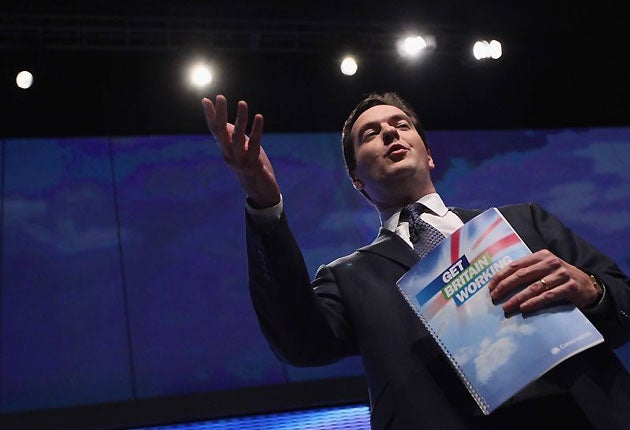Osborne plans rise in retirement age to 66
Shadow Chancellor finds £130bn savings in pensions bill and pledges to restore link with earnings in 201

Your support helps us to tell the story
From reproductive rights to climate change to Big Tech, The Independent is on the ground when the story is developing. Whether it's investigating the financials of Elon Musk's pro-Trump PAC or producing our latest documentary, 'The A Word', which shines a light on the American women fighting for reproductive rights, we know how important it is to parse out the facts from the messaging.
At such a critical moment in US history, we need reporters on the ground. Your donation allows us to keep sending journalists to speak to both sides of the story.
The Independent is trusted by Americans across the entire political spectrum. And unlike many other quality news outlets, we choose not to lock Americans out of our reporting and analysis with paywalls. We believe quality journalism should be available to everyone, paid for by those who can afford it.
Your support makes all the difference.People would be forced to work longer before qualifying for the basic state pension under a Tory government to shave £130bn off the deficit in the public finances.
George Osborne, the shadow Chancellor, will announce today that the Tories would raise the state retirement age to 66 in 2016. Labour's policy is to set the retirement age at 66 in 2026, at 67 in 2036 and at 68 in 2046.
The good news for pensioners in the Tory plan is that the money saved would allow a Cameron government to stick to Labour's plan to link the basic pension to earnings from 2012. At present, it rises annually in line with inflation, which goes up by less than earnings.
The proposal to restore the link, broken by Margaret Thatcher in 1980, was in jeopardy because of a public deficit due to reach £175bn this year. But the Tories have decided to ask people to work longer instead of delaying the higher annual rises in the state pension.
Outlining how he would fill the black hole in the public finances, Mr Osborne will tell the Tory conference: "Our aim will be to bring forward the date when the pension age rises. We will ensure that no increase will happen until the second half of the next decade – in the parliament after next. No one who is a pensioner today, or approaching retirement soon, will be affected. But this is how we can afford increasing the basic state pension for all."
Lord Turner of Ecchinswell, whose inquiry three years ago into pensions led to the Government's plan to raise the state retirement age, has admitted that he would propose a faster rise now. The Tories will order a new investigation if they win the general election to see at what stages the retirement age should be increased. Lord Turner is a leading candidate to update his 2005 report.
The women's pension age, currently 60, will already start to rise by one year every two years from 2010 so that it becomes the same as for men, who qualify for the state pension at 65.
The Tories estimate that asking people to work an extra year would save taxpayers £13bn a year, so bringing forward Labour's timetable by 10 years should save at least £130bn. They argue that life expectancy has increased since the Turner report and that many people want to work past the retirement age. A record 11 per cent of men over 65 are still in work today.
Yesterday Mr Osborne announced that new businesses would get a "national insurance holiday" for the first 10 workers they hire for the first two years of a Tory government. He said the move would create about 60,000 jobs.
He told the Manchester conference: "As well as helping more unemployed people more quickly with our work programme, we also need businesses to create new jobs for them. So we have a bold plan to abolish the tax on jobs created by new businesses for the first two years of a Conservative government."
Employers pay 12.8 per cent of the salary of employees in national insurance. The proposed relief would apply up to the upper earnings limit of about £44,000 a year, saving a small firm with 10 workers earning £25,000 a year up to £25,000 annually. Mr Osborne will spell out how the £250m plan will be funded in his keynote speech today.
David Cameron told the conference he would not adopt a "safety first" approach in the run-up to the general election and wanted to win "a strong and positive mandate" from the voters for public spending cuts. "It is the deficit and not dealing with it that is the most threatening thing to our public services and those who rely on them most," he said.
A poll by ORB for the BBC's Newsnight programme found that 64 per cent of those who intend to support the Tories will do so mainly as a vote against Gordon Brown and Labour's record.
Join our commenting forum
Join thought-provoking conversations, follow other Independent readers and see their replies
Comments